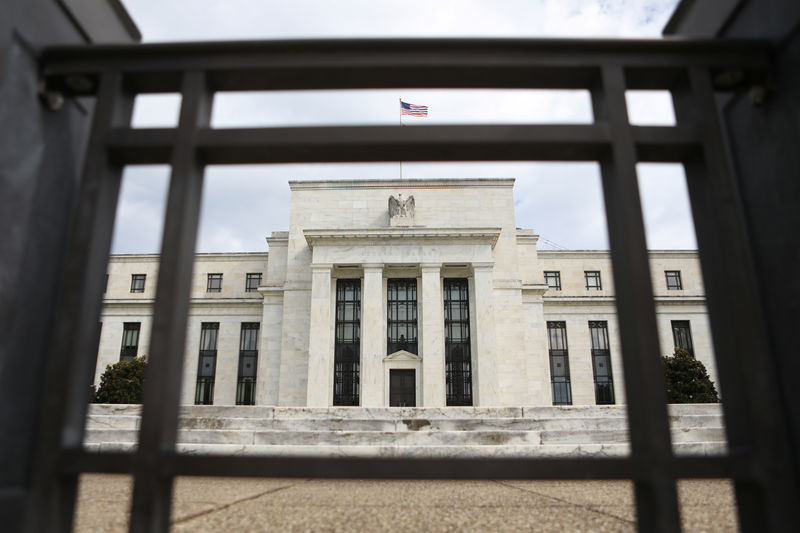Fed’s Powell opens door to potential rate cuts at Jackson Hole
By Peter Nurse
Investing.com -- The Bank of England is due to hold its latest monetary policy meeting, the Fed’s bank stress tests are due, while crude and equity indices move higher. The latest U.S. jobless numbers are also due. Here's what's moving markets on Thursday, June 24th.
1. Fed stress tests
The Federal Reserve is scheduled to release the results of its annual "stress tests", a move that could result in banks releasing billions of dollars more in stock buybacks and dividends.
In the wake of the Covid-19 pandemic, regulators decided to curb bank distributions to make sure the lenders weathered the associated economic crash.
However, helped by extreme levels of monetary and fiscal stimulus that suppressed loan losses, the largest lenders are expected to pass the test easily, leading the Fed to lift remaining capital distribution limits.
The six largest U.S. banks--Bank of America (NYSE:BAC), Citigroup (NYSE:C), Goldman Sachs (NYSE:GS), JPMorgan Chase (NYSE:JPM), Morgan Stanley (NYSE:MS) and Wells Fargo (NYSE:WFC)--will increase payouts by $66 billion to $130 billion in buybacks and dividends over the next four quarters, according calculations by Glenn Schorr, an Evercore ISI analyst.
2. Jobless claims seen resuming downward trend
The final release of first-quarter GDP is expected to confirm that the U.S. economy grew by 6.4% annualized in the first three months of the year, while durable goods orders should climb 2.8% in May, rebounding after a 1.3% fall the previous month.
However, most eyes will be on the weekly initial jobless claims numbers, particularly given the importance the Fed is placing on the labor market. The number of Americans filing new claims for unemployment benefits increased last week for the first time since April.
The release is seen falling to 380,000 for the week ending June 19, dropping again after the surprise rise to 412,000 for the week before.
3. Stocks higher; Fed speakers continue
U.S. stocks are seen opening higher Thursday, rebounding from losses during the previous session, amid optimism over the economic recovery.
By 6:45 AM ET, Dow Jones futures were up 175 points, or 0.5%, S&P 500 futures were 0.5% higher and Nasdaq 100 futures climbed 0.6%.
The main equity indices closed mixed on Wednesday, with the blue-chip Dow Jones Industrial Average dropping 0.2%, the broad-based S&P 500 fell 0.1%, while the tech-heavy Nasdaq Composite outperformed, climbing 0.1% to another record high.
More Federal Reserve officials are scheduled to speak Thursday, following last week’s central bank meeting. Another six are due to speak later, including John Williams, the president of the Federal Bank of New York, who said on Monday that more economic progress was needed before the central bank begins scaling back its asset purchases.
The earnings slate includes results from the likes of Darden Restaurants (NYSE:DRI), FedEx (NYSE:FDX) and Nike (NYSE:NKE), while the banking sector will also be in the spotlight ahead of the Fed stress test results.
4. Bank of England to walk tightrope
The Bank of England is scheduled to hold a policy-setting meeting, and faces a similar dilemma to the Fed over timing the withdrawal of stimulus.
The central bank is widely expected to keep its benchmark rate at 0.1%, a record low, at 7 AM ET (1100 GMT), while outgoing Chief Economist Andy Haldane is expected to be the only one of the nine-member MPC to vote to start reducing its bond-buying program. Haldane said earlier this month that the U.K. economy is “going gangbusters”, adding it was “hard to find anything whose price isn’t going up at the moment.”
However, the central bank will have to acknowledge that the U.K. economic recovery is gathering pace, with Wednesday’s PMI data pointing to economic activity above last summer’s levels. At the same time, inflation is also on the rise, climbing to 2.1% on an annualized basis, above the central bank's target.
Against this, Prime Minister Boris Johnson recently had to delay the country’s full reopening because of the rising number of cases of the delta variant of the Covid-19 virus, casting doubt on the strength of the recovery in the second half of the year.
5. Crude higher; U.S. inventories fall again
Crude oil prices traded near multi-years highs Thursday, with dwindling U.S. crude stockpiles adding to optimism over rising demand in the second half of the year.
By 6:45 AM ET, U.S. crude was up 0.1% at $73.16 a barrel, after climbing late Wednesday as high as $74.25 per barrel, a peak not seen since October 2018, while Brent was up 0.2% at $75.37, just off Wednesday’s $76 high, also a 2018 peak.
These gains followed the Energy Information Administration reporting a drop in U.S. stockpiles for the fifth straight week, the longest run since January 2021.
The official agency recorded a fall of 7.6 million barrels for the week ended June 18, following on from the 7.355-million-barrel draw recorded the previous week. Gasoline inventories also recorded a bigger-than-expected draw of 2.9 million barrels.
The continuous draws are indicative of a market that is tightening as large parts of the globe continue to recover from the Covid-19 pandemic.
